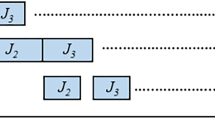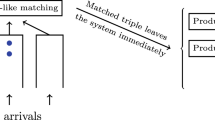Abstract
The throughput of pipelined processing ofheterogeneous multitasked jobs is computed and optimized in this study. There areK job classes. Each job hasM tasks which have to be processed in a given order (same for all tasks) on a pipeline ofM processors. Tasks have random processing times. The jobs of each class form a stationary and ergodic sequence (with respect to their task processing times). Classes are differentiated by distinct statistics and may not be jointly stationary or ergodic. Thus, the jobs are overall statistically heterogeneous. We are interested in the average execution time per job\(\bar \tau \), when the job populations of the various classes become very large (asymptotically). This is shown to depend on the order in which jobs enter the pipeline. Under the natural class-based ordering, where all jobs of the first class enter first, followed by those of the second, third, and so on, the quantity\(\bar \tau \) is computed, but is shownnot to attain its minimal value in general. On the contrary, appropriate statistical multiplexing of jobs of different classes on the pipeline is shown to minimize the average execution time per job on every sample path (with probability one). The procedure, calledbalanced statistical multiplexing, is constructed and the minimal\(\bar \tau \) is computed in terms of the average execution times of the job tasks.
Similar content being viewed by others
References
N. Bambos and J. Walrand, On the asymptotic execution time of multi-tasked processes on tandem processors, Syst. Contr. lett. 13 (1989) 391–396.
R. Bellman, A.O. Esogbue and I. Nabeshima, Mathematical aspects of scheduling and applications,Internal Series in Modern Applied Mathematics and Computer Science, Vol. 4 (Pergamon Press, 1982).
M.R. Garey and D.S. Johnson,Computers and Intractability — A Guide to the Theory of NP-Completeness (Freeman, New York, 1979).
M.R. Garey, D.S. Johnson and B. Sethi, The complexity of flow-shop and job-shop scheduling, Math. Oper. Res. 1 (1976) 117–129.
T. Gonzalez and S. Sahni, Open shop scheduling to minimize finish time, J. ACM 23 (1976) 665–679.
T. Gonzalez and S. Sahni, Flow-shop and job-shop schedules: Complexity and approximation, Oper. Res. 26 (1978) 36–52.
J.L. Hennessy and D.A. Patterson,Computer Architecture — A Quantitative Approach (Morgan Kaufmann, San Mateo, California, 1990).
J.K. Lenstra, A.H. Rinnooy Kan and P. Brucker, Complexity of machine scheduling problems, Ann. Discr. Math. 1 (1977) 343–362.
P. Walters,An Introduction to Ergodic Theory, Graduate Texts in Mathematics 79 (Springer, New York, 1982).
J. Walrand,Introduction to Queueing Networks (Prentice Hall, Englewood Cliffs, New Jersey, 1988).
E.G. Coffman Jr (ed.),Computer and Job/Shop Scheduling Theory (Wiley-Interscience, New York, 1976).
M. Pinedo and L. Schrage, Stochastic shop scheduling: A survey: deterministic and stochastic scheduling,Proc. NATO Advanced Study and Research Institute on Theoretical Approaches to Scheduling Problems, eds. M.A.H. Dempster, J.K. Lenstra, A.H.G. Rinnooy Kan, Durham, England, 1981 (Reidel, Dordrecht, Holland, 1981) pp. 181–196.
R.W. Conway, W.L. Maxwell and L.W. Miller,Theory of Scheduling (Addison-Wesley, Reading, Massachusetts, 1967).
M.L. Smith, S.S. Panwalkar and R.A. Dudek, Flow-shop sequencing problems with ordered processing time matrices, Manag. Sci. 21 (1975) 544–549.
M.A.H. Dempster, J.K. Lenstra and A.H.G. Rinnooy Kan (eds.), Deterministic and stochastic scheduling,Proc. NATO Advanced Study and Research Institute on Theoretical Approaches to Scheduling Problems, Durham, England, 1981 (Reidel, Dordrecht, Holland, 1981).
S. Lang,Real and Functional Analysis, 3rd Ed. (Springer, New York, 1993).
Author information
Authors and Affiliations
Rights and permissions
About this article
Cite this article
Bambos, N., Wasserman, K. Asymptotic optimality of statistical multiplexing in pipelined processing. Queueing Syst 21, 97–123 (1995). https://doi.org/10.1007/BF01158576
Received:
Revised:
Issue Date:
DOI: https://doi.org/10.1007/BF01158576




